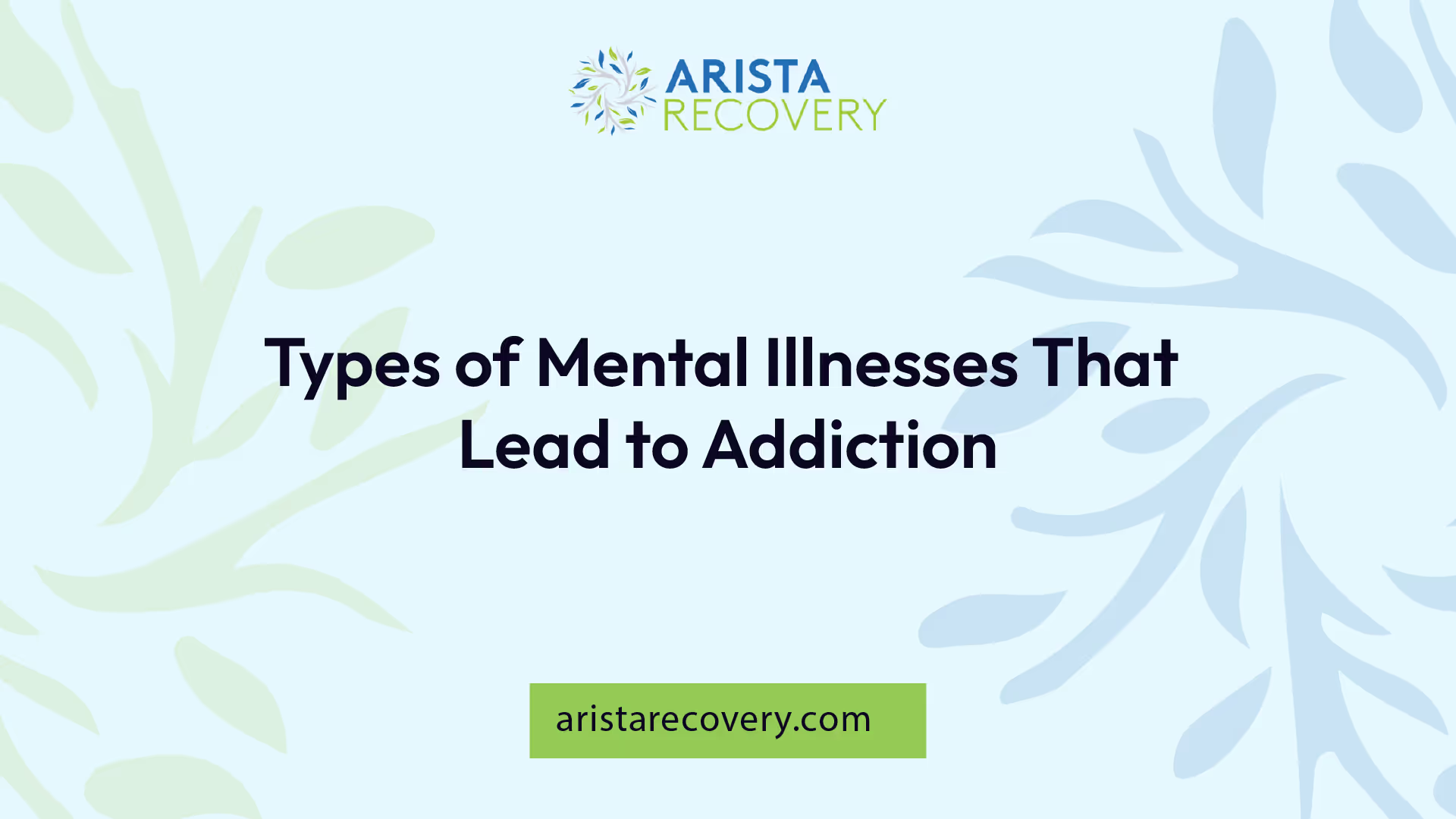
Types of Mental Illnesses That Lead to Addiction
Understanding Co-occurring Disorders
Co-occurring disorders refer to the condition where an individual suffers from both a Substance Use Disorder (SUD) and a mental health disorder. This dual diagnosis is prevalent among many populations, and understanding the connections between these disorders is crucial for effective treatment.

Substance Use Disorder and Mental Health Connections
Numerous studies have indicated that many individuals who develop SUDs are also diagnosed with various mental disorders, and the reverse is also true. This co-occurrence is particularly common among teenagers, individuals with serious mental illness, and those with specific mental disorders.
Disorder TypePrevalence of Co-occurrence (%)Anxiety Disorders20-30Depression30-50Attention-Deficit Hyperactivity Disorder (ADHD)25-35Bipolar Disorder30-60Personality Disorders40-50Schizophrenia40-50
Individuals with SUD may experience heightened symptoms of their mental health disorders, contributing to a cycle that can be difficult to break.
Common Mental Illnesses Associated with Addiction
The following mental health disorders are frequently associated with substance use:
Chronic drug abuse can occur with any mental illness recognized by the American Psychiatric Association, including generalized anxiety disorder, obsessive-compulsive disorder, post-traumatic stress disorder, panic disorder, and antisocial personality disorder.
Recognizing these connections is vital in developing effective treatment strategies that address both substance use and mental health disorders concurrently.
Impact on Treatment Strategies
Effectively addressing addiction in individuals with mental health disorders requires a comprehensive approach that considers both the substance use disorder (SUD) and the accompanying mental illnesses. The focus is on integrated treatment methods, behavioral therapies, and the role of medications.
Integrated Treatment Approaches
Integrated treatment approaches coordinate interventions for mental health and substance use, leading to more positive outcomes for individuals with co-occurring disorders. These comprehensive strategies are designed to achieve recovery, minimize relapse risks, and enhance overall mental well-being [3]. Treating both SUD and mental health disorders simultaneously is usually more effective than treating them separately [4].
Integrated treatment focuses on tailoring care to the individual's specific combination of disorders and symptoms. This personalized approach often leads to improved treatment adherence and positive recovery trajectories.
Behavioral Therapies for Co-occurring Disorders
Several effective behavioral therapies can address both substance use and co-occurring mental health disorders. These include:
Therapy TypeDescriptionMotivational InterviewingEncourages individuals to express their motivations for change.Cognitive-Behavioral TherapyFocuses on identifying and changing negative thought patterns.Contingency ManagementProvides rewards for positive behaviors related to treatment goals.Exposure TherapyHelps reduce anxiety related to specific triggers through gradual exposure.
These approaches cater to adults with SUD and differing mental disorders, helping them develop coping strategies and promoting behavioral changes essential for recovery.
Role of Medications in Treatment
Medications play a crucial role in treating addiction and alleviating symptoms of various mental disorders. There are effective pharmaceutical options available for treating opioid, alcohol, and nicotine addictions. These medications also help manage symptoms associated with co-occurring mental disorders [4].
In an integrated treatment plan, medications can be tailored to the individual's specific needs, enhancing their effectiveness. The combination of medication and therapy forms a comprehensive approach to address both substance use and mental health issues, contributing to overall recovery and wellness.
Challenges in Treatment
Navigating the treatment of individuals with co-occurring disorders presents significant challenges. The interplay between addiction and mental illnesses complicates effective care, resulting in barriers that can undermine recovery efforts.
Treatment Adherence and Dropouts
Individuals struggling with co-occurring mental disorders often experience higher rates of treatment dropout and poorer adherence to treatment plans compared to those without mental health issues. This is particularly evident among youth with these comorbidities [5]. The negative impact of such dropout rates on treatment outcomes is significant, as continuity of care is crucial for addressing both mental health and substance use concerns.
Co-occurring DisordersTreatment Adherence Rate (%)Treatment Dropout Rate (%)With Mental Disorder4555Without Mental Disorder7030
Barriers to Integrated Care
The traditional separation of services for mental health and substance use disorders presents substantial barriers to providing integrated care. Each set of services operates with unique administrative, financial, and human resource constraints, which complicates treatment for individuals with co-occurring disorders. Efforts aimed at enhancing services have been hindered by:
These barriers can impede effective communication between care providers, leading to fragmented treatment that does not adequately address the complexities of co-occurring disorders.
Genetic and Environmental Influences
Genetics play a considerable role in vulnerability to substance use disorders. Approximately 40–60 percent of risk factors for these disorders can be attributed to genetic influences. This genetic predisposition is further influenced by environmental factors, resulting in a complex interaction that affects the development of both substance use disorders and various mental illnesses. Understanding these genetic and environmental interactions is crucial in developing effective treatment strategies that address the unique needs of individuals with co-occurring disorders.
Influence TypePercentage Contribution (%)Genetic40 - 60EnvironmentalVariable
Addressing these challenges requires a multifaceted approach that considers both the individual’s mental health and substance use treatment needs.
Addressing Comorbidity
Addressing comorbidity between mental illnesses and substance addiction requires a multifaceted approach. Comprehensive assessments, integrated care models, and specialized services play essential roles in facilitating effective treatment for those affected.
Importance of Comprehensive Assessment
A comprehensive assessment is crucial for determining the specific types of mental illnesses leading to addiction. It involves evaluating both mental health and substance use histories, medical conditions, and psychosocial factors. This thorough evaluation helps healthcare providers accurately identify co-occurring disorders and develop tailored treatment plans that effectively address both conditions.
Assessment ComponentDescriptionMental Health HistoryExamination of past and present mental health issuesSubstance Use HistoryDocumentation of substance use patterns and behaviorsMedical HistoryReview of physical health and any relevant medical conditionsPsychosocial FactorsAnalysis of social environment, relationships, and stressors
Integrated Care Models
Integrated care models coordinate mental health and substance use interventions. These approaches yield positive outcomes for individuals with co-occurring disorders, helping them achieve recovery, reduce relapse risk, and improve overall mental well-being. Traditional separation of mental health and substance use disorder services has often hindered care provision.
Integrated Care BenefitsDescriptionCoordinated ServicesStreamlining treatment plans for mental and substance use disordersImproved OutcomesEnhancing recovery rates and overall healthReduced Relapse RiskMinimizing the chances of returning to substance useHolistic ApproachAddressing the individual as a whole rather than isolated disorders
Specialized Services for Co-occurring Disorders
Specialized services for individuals with co-occurring disorders are necessary to address the unique challenges they face. Providers should ensure adequate training for staff involved in treating these disorders, focusing on both mental health and substance use treatment strategies. Despite the passage of the Mental Health Services Act (MHSA) in California, ongoing challenges remain, including sustaining integrated care and adhering to diagnostic and billing requirements [7].
Specialized Service TypeFeaturesDual Diagnosis ProgramsTargeting individuals with both mental health and substance use issuesTailored Treatment PlansCustomizable treatment strategies based on individual needsTraining for ProvidersContinuous education on best practices for co-occurring disordersSupport GroupsFacilitating external support networks for individuals in recovery
Addressing comorbidity through these methods can lead to more effective treatment outcomes, enabling individuals to navigate their recovery journeys with improved support and care.
Complex Interplay of Symptoms
Understanding the intricate relationship between substance abuse and mental health is essential, especially when considering the types of mental illnesses leading to addiction. Various symptoms can overlap, creating a complex interaction that complicates treatment and recovery.
Self-Medication with Substances
Many individuals may resort to substances as a way to self-medicate, aiming to alleviate symptoms of mental health disorders. This behavior can create a vicious cycle where the initial relief from mental health symptoms ultimately leads to worsened conditions. For instance, those grappling with anxiety or depression may use alcohol or drugs to temporarily feel better, but this often exacerbates their mental health issues over time.
Substance Abuse as a Risk Factor
Substance abuse often acts as a risk factor for developing further mental health disorders. This relationship is not straightforward, as it is challenging to determine if substance abuse directly causes these issues. However, research indicates that heavy use of substances like cannabis can elevate the likelihood of developing serious conditions, such as schizophrenia [8].
Substance TypeRisk of Developing Mental DisorderHeavy Cannabis UseIncreased risk of schizophreniaAlcohol AbusePotential exacerbation of anxiety disordersCocaine UseLinked to elevated levels of aggression and mood swings
Worsening of Mental Health Symptoms
Substance abuse frequently worsens existing mental health symptoms, leading to a significant decline in an individual's quality of life. Alcohol and drugs can intensify symptoms of mental illnesses and even induce new disorders. In addition, substance abuse can interfere with the effectiveness of prescribed medications designed to manage mental health symptoms, hampering recovery efforts. This dual impact creates a challenging environment for treatment.
Impact on Mental Health ConditionEffect of Substance AbuseDepressionIncreased severity of depressive episodesAnxietyHeightened feelings of anxiety and panicSchizophreniaPotential onset of new psychotic symptoms
Overall, recognizing these complex interactions between mental health and substance use is crucial for effective treatment and recovery strategies. Identifying general warning signs can also help in diagnosing co-occurring disorders, which is essential for addressing both issues simultaneously.
Identifying and Diagnosing
Identifying and diagnosing co-occurring disorders involves recognizing the signs of mental illnesses and substance addiction. Understanding the general warning signs, overlapping symptoms, and the concept of dual diagnosis can aid in early intervention and better treatment outcomes.
General Warning Signs
Individuals struggling with co-occurring disorders may exhibit a variety of warning signs. These signs can include changes in behavior, mood, and social interactions. Some general warning signs to watch for include:
Warning SignDescriptionWithdrawal from FriendsAvoiding social interactions and isolating themselves from friends and family.Changes in AppetiteSignificant weight loss or gain due to altered eating habits.Neglecting ResponsibilitiesDifficulty maintaining work, school, or personal responsibilities.Mood SwingsExperiencing extreme emotions, such as euphoria followed by deep depression.Increased Substance UseEscalating use of alcohol or drugs to cope with emotional distress.
Individuals may turn to substances as a way to self-medicate and alleviate symptoms, leading to a worsening cycle.
Overlapping Symptoms
Many symptoms of substance use disorders and mental health disorders can overlap, making diagnosis challenging. Common overlapping symptoms include:
SymptomMental IllnessesSubstance Use DisordersAnxietyGeneralized Anxiety Disorder, Panic DisorderAnxiety related to withdrawalDepressionMajor Depressive DisorderDepression as a result of substance use withdrawalMood InstabilityBipolar DisorderMood changes related to intoxication and withdrawalCognitive ImpairmentSchizophrenia, ADHDImpaired judgment due to substance use
Substance abuse can disrupt brain chemistry and worsen mental health symptoms, leading to a complex interplay of issues [3].
Recognizing Dual Diagnosis
A dual diagnosis occurs when an individual has both a mental health disorder and a substance use disorder. Recognizing these co-occurring conditions is essential for effective treatment. Healthcare providers should look for specific indicators that suggest a dual diagnosis, such as:
Addressing both substance abuse and mental health issues simultaneously is crucial for effective treatment and recovery [8]. This integrated approach helps in providing comprehensive care, improving the chances for a successful recovery.
References
[2]:
[3]:
[4]:
[5]:
[6]:
[7]:
[8]:
When mental health challenges and addiction intersect, it can feel isolating. At Arista, we offer compassionate, evidence-based, and trauma-informed care to help you heal, grow, and move forward.
You’re not alone in this.
When mental health challenges and addiction intersect, it can feel isolating. At Arista, we offer compassionate, evidence-based, and trauma-informed care to help you heal, grow, and move forward.
Support that moves with you.
You’ve taken a brave first step. At Arista Recovery, we’re here to help you continue with best-in-class care designed for long-term healing and support.
.webp)






